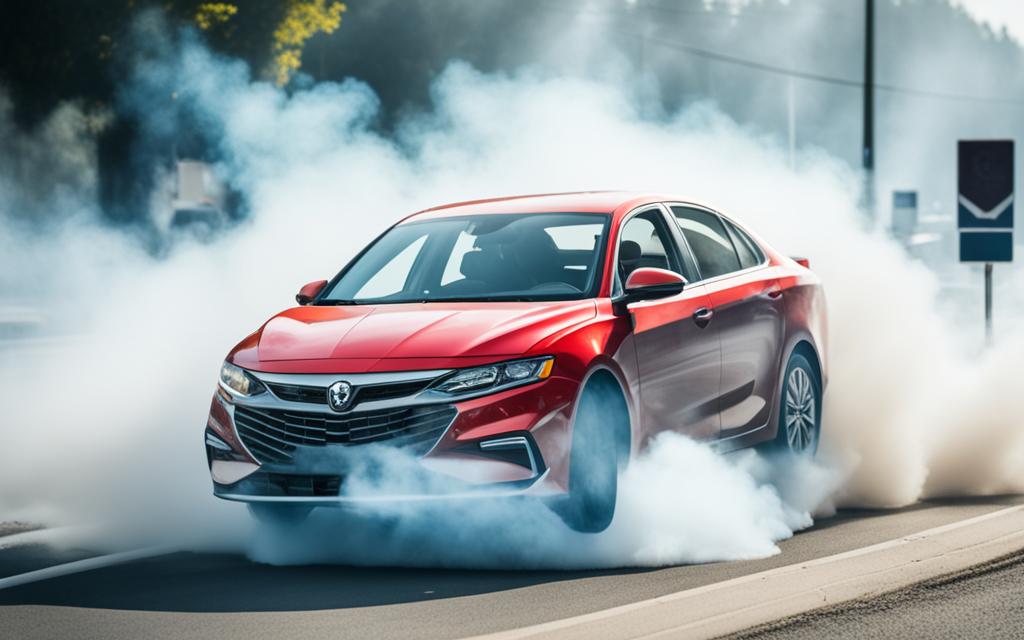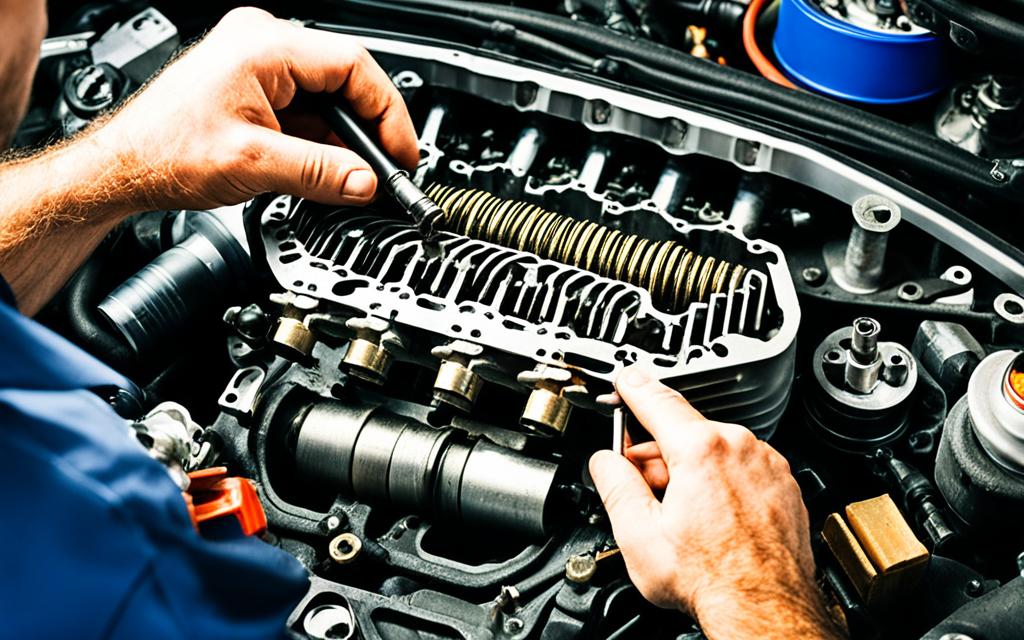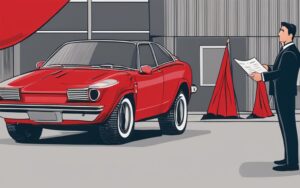Are you experiencing the frustrating issue of your car jerking when you accelerate at low speeds? Don’t worry, you’re not alone. This common problem can be caused by various factors, but fortunately, there are solutions to fix it and get you back to smooth and comfortable driving.
In this article, we will explore the possible causes of your car jerking when accelerating at low speeds and provide you with troubleshooting steps to help diagnose and fix the issue. Whether you prefer a hands-on approach or prefer to seek professional help, we’ve got you covered.
Key Takeaways:
- Car jerking when accelerating at low speeds is a common problem.
- Possible causes include fuel delivery issues, ignition problems, or transmission troubles.
- Recognize the specific symptoms of jerking, such as hesitation, rough idle, or vibrations.
- DIY troubleshooting steps can help narrow down the problem.
- When in doubt, seek professional assistance to diagnose and fix the issue.
Understanding the Car Acceleration Problem
Before we dive into the solutions, let’s shed some light on why your car might be experiencing jerking when you accelerate at low speeds. This car acceleration problem can be frustrating and unsafe, but understanding the underlying causes is crucial for effective troubleshooting.
Several factors can contribute to a vehicle jerking when speeding up:
- Fuel Delivery Issues: Inadequate fuel supply or a clogged fuel filter can result in irregular fuel flow to the engine, leading to jerking motions. This can affect the smoothness of acceleration and cause the vehicle to lurch forward.
- Ignition Problems: Faulty spark plugs or ignition coils can cause misfires, resulting in engine jerking. When the spark plugs don’t ignite the fuel-air mixture properly, it can disrupt the combustion process and create jerking sensations during acceleration.
- Transmission Troubles: Issues with the transmission system, such as a slipping clutch or damaged gears, can cause jerking when accelerating. If the gears don’t engage smoothly or if there’s excessive wear and tear, it can lead to jerky movements of the vehicle.
Visualizing the Car Acceleration Problem
Imagine a scenario where you’re driving your car and suddenly feel a jolt or hesitation as you step on the gas pedal. This jerking sensation can be accompanied by an irregular acceleration pattern, rough idling, or vibrations felt throughout the vehicle.
If your car exhibits these symptoms, it’s essential to diagnose and address the underlying issues promptly. Ignoring the car acceleration problem can potentially lead to more severe damage and costly repairs down the line.
Common Signs of Vehicle Jerking When Speeding
Here are some common signs to look out for:
- Hesitation: When you press the accelerator, the car may hesitate or take a moment to respond before accelerating.
- Rough Idle: The engine may idle roughly or make unusual vibrations when the car is stationary.
- Unsteady Acceleration: The car may experience uneven and jerky acceleration, disrupting the smooth flow of power.
If you’re experiencing any of these symptoms, identifying the cause is the first step towards resolving the car acceleration problem and regaining a smooth driving experience.
| Possible Causes | Signs and Symptoms |
|---|---|
| Fuel Delivery Issues | – Inconsistent acceleration – Fuel odor – Engine loss of power |
| Ignition Problems | – Misfires – Engine stalling – Difficulty starting the vehicle |
| Transmission Troubles | – Difficulty shifting gears – Grinding noises – Transmission slipping |
Understanding the causes and signs of the car acceleration problem will enable you to make informed decisions when it comes to troubleshooting and finding a suitable solution. In the upcoming sections, we’ll explore various steps you can take to address the issue, whether through DIY troubleshooting or seeking professional help.
Identifying Hesitation and Jerking Motion
When your car jerks during acceleration, it’s important to recognize the specific symptoms and signs that can help you diagnose the underlying problem. By paying attention to these indications, you can take the necessary steps to fix the issue and ensure a smooth driving experience.
Recognizing Symptoms
One common symptom of jerking motion while driving is hesitation. This can occur when you press down on the accelerator pedal, and instead of a smooth acceleration, the car hesitates or stutters momentarily before picking up speed.
“I noticed that my car hesitates for a second or two when I accelerate from a stop sign. It feels like it’s struggling to gain momentum.”
Another sign to look out for is a rough idle. If your car’s engine is not running smoothly while it’s at a standstill, it could indicate an issue that is causing the jerking when accelerating.
“My car shakes and vibrates heavily when I’m sitting at a traffic light or in park. This rough idle seems to coincide with the jerking motion when I try to accelerate.”
Additionally, vibrations can also be an indicator that there is a problem with your car’s acceleration. If you feel excessive vibrations in the steering wheel, floor, or seats when you step on the gas pedal, it may be related to the jerking motion.
Diagnosing the Problem
Understanding these symptoms can help you pinpoint the underlying cause of the jerking motion. It could be due to issues with the fuel system, such as a clogged fuel filter or a malfunctioning fuel pump. Ignition problems, such as faulty spark plugs or a malfunctioning ignition coil, can also lead to jerking during acceleration. Transmission troubles, such as a slipping clutch or a failing torque converter, could be another possible cause.
By paying attention to these symptoms and considering the possible causes, you’ll be better equipped to diagnose the problem and take appropriate action to resolve it.
Stay tuned for the next section, where we’ll discuss the common causes of engine jerking at low speeds.
Common Causes of Engine Jerking at Low Speeds
Engine jerking at low speeds can be a frustrating issue for car owners. It can disrupt the smoothness of your driving experience and potentially indicate underlying problems with your vehicle. In this section, we’ll explore some common causes that can lead to engine jerking at low speeds, such as issues with the spark plugs, fuel injectors, throttle body, or even the engine mounts.
Possible Causes of Engine Jerking:
- Faulty Spark Plugs: Defective or worn-out spark plugs can cause misfires in the engine, leading to jerking motion during acceleration. Regular maintenance and timely replacement of spark plugs can help prevent this issue.
- Bad Fuel Injectors: Malfunctioning fuel injectors can disrupt the fuel delivery to the engine, resulting in uneven combustion and engine jerking at low speeds. Cleaning or replacing the fuel injectors may be necessary to resolve this problem.
- Dirty Throttle Body: A dirty throttle body can restrict the airflow to the engine, causing it to run unevenly and result in jerking during acceleration. Cleaning the throttle body can often solve this issue and restore smooth performance.
- Worn Engine Mounts: Engine mounts are responsible for securing the engine in place and reducing vibration. If the engine mounts are worn or damaged, they may fail to dampen the vibrations, causing your car to vibrate during acceleration.
It’s important to note that these are just some of the common causes of engine jerking at low speeds. Depending on the make and model of your vehicle, there may be other factors contributing to this problem. If you’re unsure about the cause or unable to resolve it on your own, it’s recommended to seek professional help from a qualified mechanic.
Remember, addressing engine jerking issues promptly can prevent potential damage to your vehicle and ensure a safer and comfortable driving experience.
| Cause | Symptoms | Recommended Action |
|---|---|---|
| Faulty Spark Plugs | – Engine misfires | – Replace spark plugs regularly – Use high-quality spark plugs |
| Bad Fuel Injectors | – Uneven engine performance | – Clean or replace fuel injectors – Use fuel injector cleaner regularly |
| Dirty Throttle Body | – Restricted airflow | – Clean throttle body – Use throttle body cleaner |
| Worn Engine Mounts | – Excessive vibration | – Replace worn engine mounts |
DIY Troubleshooting Steps
If you’re a hands-on person, tackling the car jerking issue yourself can be a rewarding experience. Before taking your vehicle to a mechanic, you can try these DIY troubleshooting steps to identify and potentially fix the problem. Remember, always prioritize safety and consult your car’s manual for specific instructions.
1. Check the Air Filter
One of the common causes of car jerking during acceleration is a clogged air filter. A dirty air filter restricts airflow to the engine, leading to an improper fuel-air mixture. Locate the air filter housing in your car and inspect the filter. If it appears dirty or clogged, replace it with a new one.
2. Inspect the Spark Plugs
Worn-out or faulty spark plugs can cause misfires and result in jerking motion while accelerating. Carefully remove the spark plug wires one by one and inspect the plugs for any signs of damage or excessive wear. If necessary, replace the spark plugs with the manufacturer-recommended ones.
3. Verify the Fuel System
A poorly functioning fuel system can lead to jerking during acceleration. Check the fuel filter for any blockages or contaminants. Additionally, inspect the fuel injectors for clogs or leaks. It may be helpful to use a fuel system cleaner to remove any deposits that could be affecting performance.
4. Test the Ignition System
Faulty ignition components can contribute to car jerking issues. Inspect the ignition coils, distributor cap, and ignition wires for any signs of damage or wear. If necessary, replace these parts to ensure a reliable ignition system.
By following these DIY troubleshooting steps, you can narrow down the potential causes of your car’s jerking problem. However, if the issue persists or you’re unsure about performing these tasks yourself, it’s recommended to seek professional help.

Getting Professional Help
Sometimes, dealing with a car jerking issue can be quite challenging. If you’ve tried troubleshooting the problem yourself without success, it may be time to seek professional assistance. Taking your car to a mechanic or dealership can provide expert diagnosis and solutions to fix the car jerking problem.
When should you consider getting professional help? If you are experiencing persistent car jerking, despite trying different DIY methods, it’s best to consult a professional. Additionally, if you are unsure about the cause of the issue or lack the technical expertise to diagnose and fix it yourself, it’s wise to rely on the knowledge and experience of professionals.
A mechanic or dealership will have access to specialized diagnostic equipment and tools. They can thoroughly inspect your vehicle, including its engine, transmission, and other crucial components, to identify the root cause of the car jerking issue.
Once the problem is diagnosed, the professionals can provide you with a detailed explanation of the issue and offer appropriate solutions. Whether it’s a faulty sensor, a clogged fuel injector, or a transmission problem, they have the expertise to address the specific problem effectively.
Additionally, seeking professional help can save you time and effort. Instead of spending hours researching and troubleshooting, a qualified mechanic or dealership can quickly and accurately fix the car jerking problem, allowing you to get back on the road with confidence.
Remember, it’s important to choose a reputable and reliable mechanic or dealership. Reading online reviews, asking for recommendations from friends or family, and checking their certifications and accreditations can help ensure you receive high-quality service and a proper resolution to your car jerking issue.
“Seeking professional help for your car jerking problem can greatly assist in identifying and resolving the issue. Experienced mechanics or authorized dealerships have the necessary knowledge and resources to efficiently diagnose and fix the problem, saving you time and frustration.”
So, if you’re struggling with a persistent car jerking issue and DIY troubleshooting hasn’t yielded satisfactory results, don’t hesitate to reach out to a professional. Getting the right help can get your car running smoothly again and provide peace of mind on the road.
| Benefits of Professional Help | Drawbacks of DIY Troubleshooting |
|---|---|
| – Expert diagnosis of the issue | – Risk of misdiagnosis |
| – Access to specialized equipment and tools | – Limited knowledge and experience |
| – Time-saving solution | – Potential for more damage if not fixed properly |
| – Assurance of a proper resolution | – Frustration and stress of unsuccessful DIY attempts |
Is DIY Always the Best Solution?
While DIY troubleshooting can be a cost-effective approach, it’s not always the best solution for car jerking issues. Sometimes, the problem may be more complex, requiring expert knowledge and equipment to diagnose and repair. Opting for professional help ensures that the issue is handled correctly and efficiently, saving you time, effort, and potentially costly mistakes.
Preventive Maintenance Tips
- Regular servicing: Schedule regular maintenance checks for your car to ensure it stays in peak condition. Your mechanic will inspect crucial components like the engine, transmission, and suspension, and make necessary adjustments or replacements to prevent jerking issues.
- Fuel system cleaning: Over time, deposits can build up in your fuel system, affecting its performance and causing jerking during acceleration. Consider getting a professional fuel system cleaning to remove these deposits and restore optimal fuel flow.
- Maintenance schedule: Keep track of your car’s maintenance schedule and follow it diligently. This includes oil changes, filter replacements, and tire rotations. By adhering to a regular maintenance routine, you can prevent potential problems that contribute to car jerking.
- Inspecting spark plugs: Worn-out or faulty spark plugs can lead to misfires, hesitation, and jerking. Regularly inspect and replace spark plugs as recommended by the manufacturer to ensure smooth acceleration.
- Checking and replacing fluids: Various fluids, such as engine oil, coolant, and transmission fluid, play a critical role in your car’s performance. Regularly check their levels and condition, and top them up or replace them as necessary.
- Tire maintenance: Uneven tire wear or improper tire pressure can impact your car’s stability and cause jerking or vibration. Regularly inspect your tires, rotate them as recommended, and maintain proper inflation to avoid unnecessary strain on your vehicle.
By following these preventive maintenance tips, you can minimize the chances of experiencing car jerking issues during acceleration. Taking care of your car proactively not only ensures a smoother driving experience but can also prevent more costly repairs in the long run.
Next, we’ll explore additional solutions for addressing the car jerking issue. Keep reading to learn more!

Upgrading Performance Parts
If you’re looking to enhance your car’s performance and eliminate the issue of jerking when accelerating at low speeds, consider upgrading certain parts. These upgrades can make a significant difference in reducing jerking and providing a smoother driving experience.
1. Aftermarket Fuel Injectors
Upgrading your fuel injectors can improve fuel delivery and ensure a consistent flow of fuel to the engine. This can help prevent fuel delivery issues that may cause jerking during acceleration. Consider installing high-performance aftermarket fuel injectors for better fuel atomization and combustion efficiency.
2. Performance Ignition Coils
Upgrading to performance ignition coils can enhance the spark strength and duration, resulting in improved ignition and combustion. This can lead to smoother acceleration and minimize jerking. Look for ignition coils with higher voltage output and faster charge times to optimize engine performance.
3. High-flow Air Intake System
Installing a high-flow air intake system can increase the airflow to the engine, improving its efficiency and power output. This upgrade can help reduce jerking by providing a steady and ample air supply for combustion. Look for air intake systems that are specifically designed for your car make and model.
4. Upgraded Transmission Components
In some cases, jerking during acceleration can be attributed to transmission issues. Upgrading certain transmission components, such as the torque converter or clutch, can help improve power transfer and eliminate jerking. Consult with a professional or a reputable auto shop to determine the appropriate upgrades for your specific transmission type.
5. Performance Engine Tuning
Consider getting a performance engine tune-up or using a performance tuning module to optimize your engine’s power and responsiveness. This can iron out any inefficiencies and calibrate the engine for smoother acceleration, reducing the chance of jerking. Make sure to consult a professional tuner or technician for proper tuning.
Remember, when upgrading performance parts, it’s essential to choose high-quality components that are compatible with your car’s make and model. Consult with automotive experts or reputable shops to ensure the best fit and performance. Upgrading performance parts can go a long way in improving your car’s acceleration and eliminating the problem of jerking at low speeds.
Conclusion
In conclusion, experiencing car jerking when accelerating at low speeds can be a frustrating issue. However, by understanding the problem and implementing the appropriate solutions, you can enjoy a smooth and hassle-free ride. It is essential to follow proper maintenance practices and seek professional help when necessary to address underlying causes effectively.
By taking care of your car and performing regular maintenance tasks such as checking spark plugs, fuel injectors, and throttle body, you can prevent potential problems that lead to jerking. Additionally, following the recommended service schedule, keeping the air filter clean, and conducting fuel system cleaning can go a long way in maintaining optimal performance and longevity of your vehicle.
For more complex issues or when troubleshooting steps prove insufficient, it is advisable to seek professional assistance from a mechanic or dealership. Their expertise and diagnostic tools can help identify the root cause of the problem and ensure an accurate fix, restoring your car’s performance.
Remember, a well-maintained car not only provides a smoother driving experience but also contributes to your safety on the road. By staying proactive and addressing car jerking issues promptly, you can restore your vehicle’s performance and enjoy a comfortable ride every time.
FAQ
Why does my car jerk when accelerating at low speeds?
A jerking motion while driving can be caused by various factors. Some possible causes include issues with the fuel system, ignition system, or transmission. It is recommended to have a professional diagnose the problem to determine the exact cause and necessary repairs.
What are some common causes of car hesitation when accelerating?
Car hesitation when accelerating can be caused by a variety of issues. Some common causes include a clogged fuel filter, worn spark plugs, a malfunctioning oxygen sensor, or a faulty mass air flow sensor. It is best to have a qualified mechanic inspect and diagnose the issue.
Why is my car vibrating during acceleration?
Several factors can lead to vibrations during acceleration. Some possible causes include imbalanced or worn-out tires, damaged suspension components, or problems with the drivetrain or CV joints. A thorough inspection by a professional technician is recommended to determine the exact cause.
How can I troubleshoot a jerking motion while driving?
If you are experiencing a jerking motion while driving, there are steps you can take to troubleshoot the issue. Start by checking for any loose or damaged connections in the fuel and ignition systems. Additionally, inspect the spark plugs, air filter, and throttle body for any signs of damage or wear. It is also advisable to scan for error codes using a diagnostic tool.
When should I seek professional help for a car jerking issue?
If you have attempted basic troubleshooting steps and the car jerking issue persists, it is advisable to seek professional help. A qualified mechanic will have the necessary tools and expertise to diagnose the problem accurately and recommend the appropriate repairs.
What can I do to prevent car jerking issues?
Regular preventive maintenance is key to preventing car jerking issues. This includes keeping up with scheduled maintenance tasks such as oil changes, spark plug replacements, and air filter changes. It is also important to address any issues promptly and avoid driving aggressively, as these can contribute to jerking problems.
Can upgrading performance parts reduce jerking during acceleration?
Upgrading certain performance parts can potentially reduce jerking during acceleration. For example, installing high-quality fuel injectors, performance ignition coils, or a performance air intake system may improve engine response and reduce jerking. However, it is important to research and choose reputable brands and consult with experts to ensure compatibility and proper installation.








